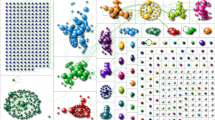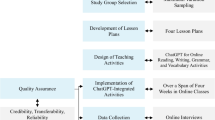Abstract
Critical pedagogy employs dialogue that is embodied, reflective, and authentic with aims to promote action toward social justice. Although online learning is well suited to support several characteristics of critical dialogue (i.e., participant diversity, student discussions, emphasis on reflection), it can also be impersonal and disembodied. The purpose of this paper is to explore the experiences and perceptions of online doctoral students in a course designed to facilitate critical dialogue about education. The course experimented with three discussion formats aimed at achieving critical dialogue: (a) traditional, text-based discussion board; (b) asynchronous video (voice thread), and (c) recorded small-group, synchronous video discussions followed by asynchronous discussion board interactions. In this paper, we share results from student surveys of three semesters of the course (n = 22 of 46 students enrolled). The findings suggest that students preferred synchronous video chats and perceived this format as most supportive of critical dialogue. Students, on average, rated the discussion board format as the least enjoyable, least engaging, and least supportive of critical dialogue. Students’ open-ended comments emphasized that the discussion board and voice thread formats promoted reflection but were less supportive of interactive dialogue. We conclude by discussing implications regarding course design and student support for online instructors who aim to promote critical dialogue in online courses.

Similar content being viewed by others
References
Apple, M. (2003). The new technology: Is it part of the solution or part of the problem? In A. Darder, M. Baltodano, & R. Torres (Eds.), The critical pedagogy reader (pp. 440–458). New York: Routledge.
Borup, J., West, R. E., & Graham, C. R. (2012). Improving online social presence through asynchronous video. The Internet and Higher Education, 15(3), 195–203.
Borup, J., West, R. E., & Graham, C. R. (2013). The influence of asynchronous video communication on learner social presence : A narrative analysis of four cases. Distance Education, 34(1), 48–63.
Boyd, D. (2016). What would Paulo Freire think of blackboard: Critical pedagogy in an age of online learning. International Journal of Critical Pedagogy, 7(1), 165–186.
Clark, R. E. (1983). Reconsidering research on learning from media. Review of Educational Research, 53(4), 445–459.
Clark, R. E. (2013). “Learning from media” debate: Is the grocery truck analogy still valid 30 years later? AECT: Anaheim.
Clark, C., Strudler, N., & Grove, K. (2015). Comparing asynchronous and synchronous video vs. text based discussions in an online teacher education course. Online Learning, 19(3), 48–69.
Darder, A., Baltodano, M., & Torres, R. (2003). The critical pedagogy reader. New York: Routledge.
Freire, P. (1970). Pedagogy of the oppressed (M. B. Ramos, trans.). New York, NY: Continuum.
Freire, P., & Macedo, D. (1995). A dialogue: culture, language, and race. Harvard Educational Review, 65(3), 377–403.
Garrison, D. R., Anderson, T., & Archer, W. (2010a). The first decade of the community of inquiry framework: a retrospective. The Internet and Higher Education, 13(1), 5–9.
Garrison, D. R., Cleveland-Innes, M., & Fung, T. S. (2010b). Exploring causal relationships among teaching, cognitive and social presence: student perceptions of the community of inquiry framework. The Internet and Higher Education, 13(1), 31–36.
Hilton, J. T. (2013). Digital critical dialogue: a process for implementing transformative discussion practices within online courses in higher education. MERLOT Journal of Online Learning and Teaching, 9(4), 602–614.
Hudson, B. (2002). Critical dialogue online. In Rudestam K. (Ed.), Handbook of online learning: Innovations in higher education and corporate training (pp. 53–90). Thousand Oaks, CA: Sage Publications.
McLaren, P. (2015). Life in schools: An introduction to critical pedagogy in the foundations of education. Routledge.
Moore, M. G. (1973). Toward a theory of independent learning and teaching. The Journal of Higher Education, 44(9), 661–679.
Moore, M. G. (2013). The theory of transactional distance. In M. G. Moore (Ed.), Handbook of distance education (pp. 66’’85). New York: Routledge.
Rudick, K. C. (2016). Online only classes and critical dialogue: toward a Faustian bargain ideal for virtual education. Pedagogy and Theatre of the Oppressed Journal, 1(1).
Yin, R. K. (2017). Case study research and applications: Design and methods. Los Angeles: SAGE Publications.
Author information
Authors and Affiliations
Corresponding author
Ethics declarations
Conflict of Interest
The authors declare that they have no conflict of interest.
Ethics Approval
Approval was obtained from the ethics committee of Arizona State University. The procedures used in this study adhere to the tenets of the Declaration of Helsinki.
Consent to Participate
Informed consent was obtained from all individual participants included in the study.
Consent to Publish
Not applicable (no identifying information of participants is included)
Additional information
Publisher’s Note
Springer Nature remains neutral with regard to jurisdictional claims in published maps and institutional affiliations.
Electronic supplementary material
ESM 1
(PDF 219 kb)
Rights and permissions
About this article
Cite this article
Warr, M., Sampson, C. Achieving Critical Dialogue in Online Doctoral Programs: an Exploration of Student Perceptions and Experiences with Multiple Modalities. TechTrends 64, 860–867 (2020). https://doi.org/10.1007/s11528-020-00499-z
Published:
Issue Date:
DOI: https://doi.org/10.1007/s11528-020-00499-z




